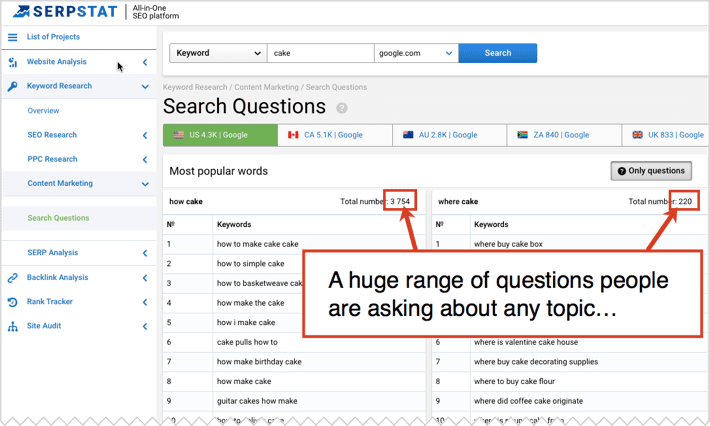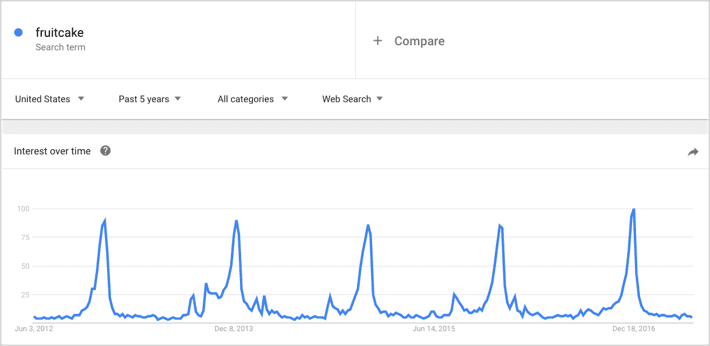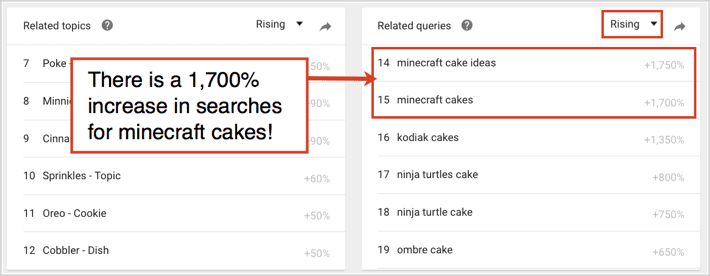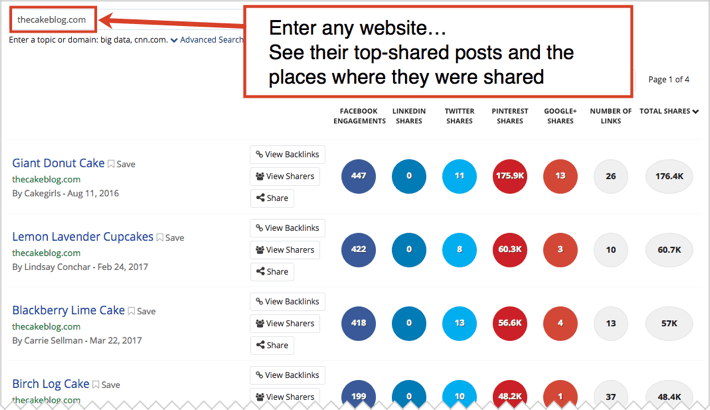This article originally appeared on PR Daily in November of 2017.
You’ve committed to blogging and the deadline is looming, but the screen in front of you is blank.
If you’re not sure what to write about, don’t fret; blog topics are everywhere.
To show how easy it is to find blog topics for any business, let’s use a random word to find a theme. How about “bake”? Let’s assume we’re promoting a baking company, blogging about cakes and baking. Keep in mind, each source listed below can be used for any company in any industry.
Blog topics from keyphrase research tools
Keyphrase research isn’t just for SEO. It’s a fun, fast way to read the minds of millions of people and find great blog topics.
1. Use topics Google suggests.
Whenever you search in Google, you’ll see suggested topics as Google auto-completes your query with a longer phrase. This is convenient for searchers, but it’s also a potential goldmine for savvy bloggers.
Just type in a question word (such as “which”) and your topic word (such as “cakes”), and Google will suggest a list of blog topics.

Add a letter, and you’ll see more suggestions. Of course, it’s a long process to enter all 26 letters of the alphabet. Fortunately, there are tools that do this for you. One is Keyword Tool.

These might be topics you would never have considered; each is pulled directly from Google, which proves there is demand for that topic in search engines.
Another tool pulling topics from Google Suggest is SerpStat, which filters question phrases.

These question-related topics can fuel posts that drive traffic.
2. Get ideas from Google’s Keyword Planner.
The Keyword Planner is part of AdWords, but you don’t have to advertise on AdWords to use it. You just have to log in with a Google account.

This tool suggests up to 800 phrases, each one a topic with a ranking advantage.
The Keyword Planner also shows you the number of monthly searches for each phrase. That number isn’t perfectly accurate, but that doesn’t matter, because we’re just looking for ideas.
3. Jump on a trending topic.
Google Trends also makes suggestions, but mostly it shows how phrases trend over time. It’s useful for checking seasonality, such as that for “baking.”

Be sure to time those seasonal topics carefully. Your fruitcake window is exceedingly small.

Trends is also an excellent tool for estimating the relative popularity of two topics. For example, would you say cupcakes or muffins are more popular? According to Google Trends, cupcakes are more popular, but it’s getting close.

Finally, look in the bottom right corner to see a box with a list of 25 recommended phrases. Select “Rising” from the dropdown to see phrases that are becoming more popular.

Write up some of these topics and publish quickly. These trending topics will probably do well on social media, which is another great trove of inspiration.
Get ideas for posts from social media
Social media is for sharing, but it’s also for monitoring. Social media data is mostly public, so it’s fast and easy to find what’s getting traction.
[RELATED: Earn recognition for your captivating videos and visual designs.]
4. Pick topics that are getting shared like crazy.
BuzzSumo offers a paid and free version, and both can be used for strategic social listening.
When you enter any phrase into BuzzSumo’s content research tool, you’ll immediately see a list of the most shared posts on the topic. Shares are broken down by social network, showing where each piece got the best results.

It’s a goldmine.
Then try Buzzsumo’s Facebook Analyzer to find trending topics on Facebook. Set the date range for 24 hours to jump on a trend or to view the past year to find a more enduring topic.

When you find popular posts, use BuzzSumo to see who shared the article. If they liked that post, they’ll probably like your piece, too. Reach out to them, and share your article. Better yet, collaborate with them when you’re writing it.
5. Mine Quora for top questions and answers.
Quora is another trove of questions, answers and experts. That means topics, research and collaborators.
Thanks to a system of upvoting, the best of everything rises to the top.
- Quora questions
These can suggest topics for your site. Top questions are probably the best topics. - Quora answers
This is a head start on the research for that topic. Top answers tend to be the most informative and complete. - Quorans
That’s what members of this network are called. They are possible contributors to the article you’re writing.

Quora also makes a great testing ground for new content ideas. Try posting a question and invite relevant Quorans to answer. This will give you a head start on research for your blog post.
If you want feedback on content before publishing anything, post it as an answer and see whether you get upvotes or comments.
Blog post topics from competitive analysis
What’s working for the other guys? The answers are easy to find. Competitive analysis tools are an excellent way to get ideas.
6. Find topics your competitors are ranking for.
Search engine rankings are public, so there are tools that reveal the rankings for any website. SEMrush is my favorite.
Enter the address of any competitor website, and you’ll see a list of phrases they rank for. This research offers a deep well of blog post ideas—each with an SEO advantage.

The free version of SEMrush shows you the top 10 phrases that any website ranks for. The paid version gives you all the rankings for all their key phrases.
7. Find FAQs on other websites.
FAQ Fox is another tool that scrapes websites for popular questions. Just enter a topic or key phrase and pick a category (or select “Generic”), then enjoy a long list of popular topical questions.

This tool searches niche sites and big guys such as Reddit. You can also enter your own favorite sites, such as influential industry blogs or competitor websites.
8. See what’s getting traction on the big blogs.
Let’s use BuzzSumo in a slightly different way. Instead of adding a topic, enter a website.
You’ll see all the website’s top-shared posts. This unlocks a wealth of topics and reveals the online networks where these topics found a happy home.

It’s perfectly fine to use other sites for topic inspiration; just don’t plagiarize. Always err on the side of giving too much attribution.
There’s always room for another giant doughnut cake article on the web; just bake it up with your own ingredients.
If you do derive inspiration from others, mention and thank them in your new content. Maybe they’ll share it, too.
Andy Crestodina is Orbit Media’s co-founder and CMO. A version of this post first appeared on the Orbit Media blog.
(Image via)
from PR Daily News Feed https://ift.tt/2zGL0jY
No comments:
Post a Comment